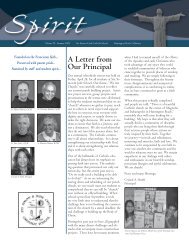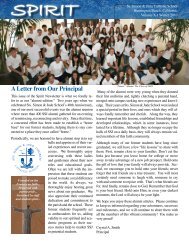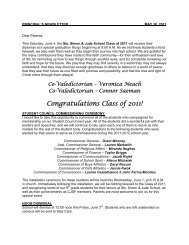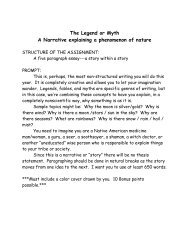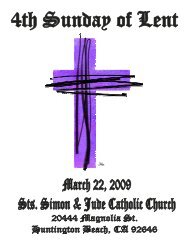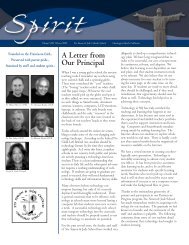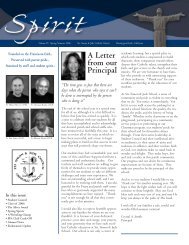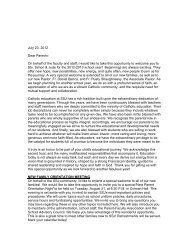Emery R Tang OFM Funeral Homily
Emery R Tang OFM Funeral Homily
Emery R Tang OFM Funeral Homily
- No tags were found...
Create successful ePaper yourself
Turn your PDF publications into a flip-book with our unique Google optimized e-Paper software.
<strong>Funeral</strong> <strong>Homily</strong>ForEMERY RICHARD TANG, <strong>OFM</strong>In China, there is an old story about two earthen jugs that a water bearer carried to themaster’s house each day. He would loop the handle of each over a pole across hisshoulders, fill them at the river and carry them up the mountain path. Now—one of thejars was badly cracked. It had a crack down one side that caused it to leak half of itswater before arriving at the master’s house. The defect was plain to see, but the waterbearer did not discard the jar. He was careful to put it on a different side each day toease the ache in his back caused by the uneven load. Because of its poor performance,the cracked jar felt inferior to the sound jar. It was ashamed of how it wasted the effortsof the water bearer.After years of daily trips to the river, it could no longer keep silent. One day it said tothe water bearer, “I am so sorry for my flaw. It is unfair that you work so hard and onlyget the result of half as much work because of my imperfection. You should findanother jar that is as sound as my companion so your efforts are not wasted”. Thewater bearer walked on in silence for awhile and then said, “You should not compareyour work to the work of the other jar. I need both of you to accomplish the master’swork. I know of your imperfection and have put it to good use”.As they made their way up the mountain path that day, the water bearer pointed outthe beautiful flowers that grew on each side of the path. He went on to say,For many years nothing would grow here. The soil is dry and no one could takethe time to provide water for plants to grow. But you have found a way tonourish the flowers that takes no extra work. You please the master not onlywith the water you bring to his house, but the water you spill along the waywhich has given us this garden of beautiful flowers”.1
In the beginning God’s design for all of creation was as perfect as the sound jar in ourstory: there were no cracks in God’s jar. God’s vision for humankind was perfect andprecious. God did not make suffering, pain, sickness, and death. God fashioned all ofcreation to be life giving and worthy of God’s loving touch.However, weak water bearers came along and damaged God’s creation just as thecracked jar had been damaged. What was once a beautiful piece of pottery now had abad crack. Where there was once light and life, now there was darkness and death.Where there was once hope and love, now there was despair and hate. So creation wasdamaged and we seem at times to be like that cracked jar of the water bearer: futile,useless, and wasting.But God’s intention did not waver; God’s intention remained the same. God intendedthat our jars would be whole—that our jars would produce life. God did not makedeath. God did not put the crack in the jars of our life. Nor was God content to sit backand allow death to have the final word, to have death drain us of all life. In otherwords, no way was the crack in our jars going to make us useless and wasteful.Something would have to happen to that cracked jar to make it a beautiful piece ofpottery again. And so the God-man named Jesus was born into the world as one of us,to experience suffering and death from the inside. But from Jesus’ death, from the crackin Jesus’ jar, God would fashion something new for the human race and for all ofcreation. Jesus then would use death itself-the crack in the jar-to give life, everlastinglife. From Jesus’ jar, flowers would be watered and blossom. So Jesus did not abolishdeath: he knew he would die; he knew he had to die; he was ready to die. And why?Because with his death, death would cease to be the enemy. Oh, I do not mean thatwith Calvary, on Calvary, death became easy; it did not. I mean that on Calvary, Christgave death a new look, a fresh meaning.2
What this new meaning is can be said quite simply: from the death of Jesus Christ, lifewas born, not only for him but also for us. That, which was thought to be useless andcracked, now gives life. And gardens are watered and beautiful flowers bloom for all toenjoy and to praise God.There is a danger that each of us leave the jar of our life untouched because we fear thecracks that are there. We feel that they are too deep, too wide, too broken. The crackedjar in the parable felt sorry for the water bearer because the jar felt it wasn’t doing itsjob. If we look at our jars and put them in the corner to collect dust, then indeed we canend up being useless; we end up wasting precious life. But through Jesus God inviteseach one of us to use the cracks in our jar to water the gardens of our lives to create newlife, to create our own garden of flowers. Jesus used the crack in his jar to create newlife and so he tells us: “Whoever serves me must follow me and where I am, there willbe my servant”. ( John 12:26)Today we come together to praise our God for <strong>Emery</strong> Richard <strong>Tang</strong>’s life and hisbeautiful garden. As you well know, <strong>Emery</strong> was a master gardener and took greatpride in his flowers. In <strong>Emery</strong>’s own words:“The loveliness of flowers in my life is a constant reminder of God’s marvelouscreativity and never-ending thoughtfulness and care. Blossoms show me thatwith each “ohh” and “ahhh” I breathe, God the unseen is somewhere in thewings, smiling at my pleasure. (FFJ, p. 71)We gather then to honor a good man who did not put his jar aside to collect dust.Rather he faithfully and constantly hauled the water of life so that he could growbeautiful flowers in his garden, which were only a sign of God’s tremendous love foreach of us.3
<strong>Emery</strong> walked up and down the path of life for eighty-one years. That is a lot ofwalking. Sometimes the walk was easy for him; sometimes the path was rocky, but henever gave up; he never quit. He faithfully carried the jar of water each day of his life—spilling his life so that his garden could grow. Today let us look at that garden hewatered and some of the flowers in that garden. But first, let me be clear about theseflowers that I will identify. I found these flowers in his own writings, especially in hislast book, FOOD FOR THE JOURNEY. These are the flowers that gave him the greatestjoy, and he shared them with us.The first flower in his garden is the gift of wisdom. On the occasion of his 50 th Jubilee asa priest, I said in my homily that of “all the gifts he had received from God and hisparents, the one gift that stands out is wisdom.” This is the wisdom who hastens tomake herself known to those who desire her. And God has made his Wisdom knownthrough <strong>Emery</strong>’s life and ministry. In the Scriptures, the wise person is the expert in theart of good living. Passion does not sear him; he is self-possessed. Wrath does notwrack him; he is patient; he is cool He is a knowledgeable man; he’s mastered a field,may even have academic knowledge, but more importantly, he is at home with hisknowledge; it rests lightly yet securely upon him. Doesn’t that picture of the wise manof the Scriptures describe <strong>Emery</strong> perfectly?It has been this gift of wisdom that has been the source of all that he has done—whetherit was teaching in a classroom, sitting in a principal’s office, preaching from the pulpit,producing communications media, taking a photo or writing a book, planting agarden—all of it has been about preaching God’s Word with wisdom.In <strong>Emery</strong>’s own words of wisdom:On forgiveness: ‘those who do not forgive destroy the bridge over which theymay one day need to pass’. FFJ, p. 1184
On generosity: ‘if only there were a simple, inescapable way to be convinced thatsharing my gifts and goods, not amassing or wasting them, is the key to thehappiness that is so desirable but so elusive in life’. FFJ, p..54On life’s accomplishments: ‘looked at with the proper perspective, I’ll never be ableto accomplish all I would like to do, but I know I have all the time I need to do whatGod would have me do’. FFJ, p. 57Now, in God’s own Word from the Wisdom of Solomon:I learned both what is secret and what is manifest,for wisdom, the fashioner of all things taught me. (7: 21-22)Oh, yes, wisdom is definitely a flower in <strong>Emery</strong>’s garden.The second flower in his garden is the belief that the love of God, the love of others, and thelove of self is the secret of good living. This belief was not only the heart of his teachingand preaching, but it was the heart of who he was as a man, a friar, and a priest. Hismessage was quite simple: love is doing good to others. No strings attached. Period. Heencouraged us to do good because we should want to do good. It is the motive that counts.And the good must be unilateral—nothing expected in return and that is risky business.<strong>Emery</strong> challenged us to risk love because deep down we are all afraid of being taken. Andthe basis of this love must be the love of Christ. He says, “I am convinced that there is onlyone truth—the love of Christ”. And the acceptance of that love requires a willingness tochange: our attitudes, our prejudices, our opinions, our positions on all kinds of issues.Yes, love is risky business, but we should not fear. <strong>Emery</strong> took great consolation in St.Paul’s words: “For I am convinced that neither death, nor life, nor angels, nor rulers, northings present, nor things to come will be able to separate us from us from the love of God”(Rom 8: 38-39)In <strong>Emery</strong>’s own words of love:5
Love is God, without beginning and without end. God is all-good, forever pouringout goodness. God can’t do anything else. It’s impossible for God to run out ofgoodness and to stop giving. Conversely, it’s impossible for God to do anythingwhich is not good or which is bad. Love can only do what is good.The amazing fact is that I am made in God’s image. This means that I am createdout of God’s love in order to love and, of course, to be loved. The more I love then,the closer I approach to being Godlike. The result is that I share more abundantly inthe beatific joy that is God’s nature.For Love to be Love, it first of all must be freely done. It can’t be forced or legislated.I have to want and choose to do good for someone, starting with myself. That is thereal power and beauty of love. FFJ, pp. 95 – 96.Now in God’s own Word from the Gospel of John:As the Father loves me, so I also love you. Remain in my love.This is my commandment: love one another as I love you. (15:9-12)Oh, yes. Love is definitely a flower in his garden.The third flower I find in his garden is the commitment to a world in which there is justicefor all. For the Jews of old, NOT to execute justice was NOT to worship God.For <strong>Emery</strong>, NOT to preach justice is NOT to preach the gospel. In his preaching he wouldoften point to the violence and division in Church history and ask, “Is this the result ofJesus’ coming? I guess God is having a hard time communicating”.Therefore, he was not afraid to take on the justice issues of his day: nuclear war, the deathpenalty, the homeless and the hopeless, the senior abused and confused, the teenagemother hooked on coke and the teenage boy taking his gun to class, the millions toodiscouraged to look for work, the unnumbered hearts that harbor hate, eyes empty of hope,6
stomachs bloated with hunger. <strong>Emery</strong> preached not only a gospel of hope to them, but agospel of love about them.One of the most poignant justice words he preached was a Telespot produced byFranciscan Communications. In this short spot, a finely dressed woman is walking up to achurch in downtown Los Angeles. As she goes up the steps of the church, she passes ahomeless person sitting there. She turns and gives a look of disdain. And as she is about toenter the Church, the picture freezes. Then comes the voice:If you don’t find God out here, you certainly won’t find him in there”. You can just picture<strong>Emery</strong> saying those words while giving that look of his that spoke volumes.Now in God’s own Word from the Gospel of Matthew:And the king will answer them, ‘Truly I tell you, just as you did it to one of the leastof these who are members of my family, you did it to me. (25:40)Oh, yes. Justice is definitely a flower in his garden.Finally, the last flower I have identified is family and friendship. This is really one flowerin his garden. For <strong>Emery</strong>, if you were a member of his family, you where his friend and ifyou were his friend, then he considered you his family. To <strong>Emery</strong>’s family: you know howmuch he loved you and he knew how much you loved him. He was always there for youand you for him. And to his friends: you know how he prized your friendship by the wayhe kept in touch by word and deed.In <strong>Emery</strong>’s own words of friendship:Without any qualification, my friend is my life’s most precious treasure. Again andagain, I praise and thank God for so wonderful a gift: someone who truly cares forme, anticipating and providing for my needs and who will stop at nothing toprovide for my well-being, asking nothing in return…Friendship is a warm blanket7
of comfort and security in which I can wrap myself during conflict and struggle. Myfriend lends a sympathetic ear to my travails and comforts me when I am afflictedby grief. When I embark on a new endeavor I can always count on my friend forhonest analysis, advice and support. When I am underway, my friend stands by mewith encouragement and honest criticism through ups and downs of anyundertaking. If I veer off course or become distracted, my friend rouses me andstraightens me out. FFJ, p. 46Now in God’s own Word from the Gospel of John:And I will soon show to you and to everyone, there is no greater love than to laydown your life for your friend. I have shared all of this so that you can share in myown infinite joy, and then, my beloved friend, your joy will be complete. (15:10-15)Oh, yes. Family and friendship is definitely a flower in his garden.Now these are only some of the flowers in his garden, watered from <strong>Emery</strong>’s jar of life. Butthose certainly are not the only flowers. You see he has a flower for each of you. He grewit just for you. Today, look at it, appreciate its beauty, honor it, celebrate and praise Godand <strong>Emery</strong> for it, and then share your flower with another.And for Fr. <strong>Emery</strong>. Indeed there is much to mourn as there was much to mourn onCalvary. We shall have to wait for the resurrection on the last day before we see thatinviting smile of his, before those sharp eyes look at us, before we hear that melodiousvoice with his words of wisdom and challenge. All of that is sad—no matter howprofound our faith. But the thrilling truth remains: <strong>Emery</strong> is alive with God. In thepresence of God, there is only God, there is only Love. In the presence of God, everycracked jar pours forth the water of life.And we who remain? What of us? We have our memories, of course, and they areprecious. But there is more, much more. <strong>Emery</strong> Richard <strong>Tang</strong> is not merely a memory, he8
is part of us. He is built into our lives. His wisdom and smile, his kindness and love, hisfriendship and service—all have seeped into our lives. Because of him and his life as a friarand priest, we are more human, more life-giving, more blessed.And now, finally, in <strong>Emery</strong>’s own words:And so, in these remaining years my goal is to accept the challenge to “fight thegood fight” to the end, as Paul urged his friend Timothy (I Tim 6:12) Then what anenormously thrilling and wondrous moment it will be to discover the full answers tolife’s who, what, when, where and why. FFJ, p. 5And now, finally, in God’s own Word from St. Paul:No eye has ever seen nor ear heard nor has any mind ever conceived thethings God has prepared for those who love him.” (I Cor 2;9)And so, <strong>Emery</strong>, my teacher, my brother and my friend, rest well as you enjoy the mansionGod has prepared for you. Now it is time for you to walk in God’s garden where with eachflower God is saying to you, “<strong>Emery</strong> Richard <strong>Tang</strong>, I love you.” AMENMelvin A. Jurisich, <strong>OFM</strong>Ex. Min. Prov.St. Bonaventure’s ChurchHuntington Beach, CA9



